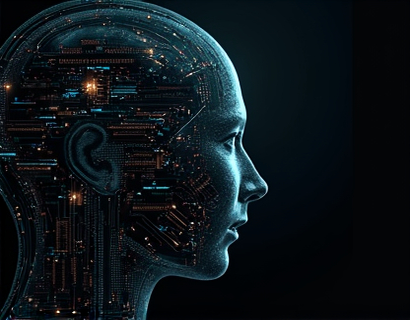Elevating Digital Engagement: The Synergy of Crypto and AI
The intersection of cryptocurrency and artificial intelligence (AI) is ushering in a new era of digital innovation, transforming the way we interact with technology and each other. This fusion of technologies is not only redefining user experiences but also driving substantial growth in the tech sector. As we delve into the latest advancements, it becomes evident that the combination of these two powerful forces is creating a more connected, secure, and intelligent digital landscape.
The Role of Cryptocurrency in Digital Transformation
Cryptocurrency, since its inception, has been more than just a digital currency. It has evolved into a foundational element of the blockchain ecosystem, offering transparency, security, and decentralization. These properties are crucial for enhancing digital engagement. Blockchain technology ensures that transactions are immutable and verifiable, reducing the need for intermediaries and increasing trust among users. This trust is fundamental for any digital platform aiming to foster meaningful interactions and long-term relationships with its audience.
Moreover, the decentralized nature of cryptocurrencies empowers users by giving them control over their digital assets. This shift from centralized to decentralized systems aligns perfectly with the growing demand for user-centric solutions. Platforms that leverage cryptocurrency can offer more personalized and secure experiences, which are key factors in driving user engagement and loyalty.
AI: The Brain Behind the Digital Curve
Artificial intelligence, on the other hand, brings a level of intelligence and adaptability that complements the transparency and security of cryptocurrency. AI algorithms can analyze vast amounts of data to identify patterns, predict trends, and make informed decisions. In the context of digital engagement, AI can enhance user experiences by personalizing content, optimizing user interfaces, and providing real-time support.
For instance, AI-driven chatbots can offer instant and accurate assistance, reducing user frustration and improving satisfaction. These chatbots can understand natural language, learn from interactions, and adapt to user preferences, creating a more seamless and intuitive experience. The integration of AI in customer service not only enhances efficiency but also allows human agents to focus on more complex and critical tasks.
Enhanced User Experiences Through Crypto and AI
The combination of cryptocurrency and AI is particularly potent in creating enhanced user experiences. One of the most significant benefits is the ability to offer secure and private transactions. Blockchain technology ensures that user data and transactions are protected from unauthorized access, which is a major concern in the digital age. AI can further bolster this security by detecting and preventing fraudulent activities through advanced analytics and machine learning algorithms.
Personalization is another area where crypto and AI intersect to elevate user experiences. AI can analyze user behavior and preferences to curate content and recommendations that are highly relevant. When paired with cryptocurrency, this personalization can extend to virtual goods and services, allowing users to purchase and own unique digital assets with confidence. The use of non-fungible tokens (NFTs) powered by blockchain ensures that these assets are unique and verifiable, adding a new dimension to digital ownership and engagement.
Connectivity and Community Building
The synergy of crypto and AI also plays a crucial role in building and maintaining communities. Decentralized platforms can foster stronger connections among users by providing transparent and fair mechanisms for participation and governance. AI can enhance these communities by facilitating better communication, identifying community trends, and suggesting activities that align with user interests.
For example, decentralized autonomous organizations (DAOs) leverage blockchain and AI to create community-driven projects where members can vote on proposals and contribute to decision-making processes. This level of inclusivity and transparency not only increases user engagement but also builds a sense of ownership and loyalty among community members.
Innovative Applications and Use Cases
The potential applications of crypto and AI are vast and varied, with numerous use cases that are already transforming industries. In the gaming sector, for instance, crypto and AI are revolutionizing the way players interact with virtual worlds. Blockchain ensures that in-game assets are unique and tradable, while AI enhances gameplay through dynamic content generation and intelligent NPCs (non-player characters). This combination creates more immersive and engaging gaming experiences.
In the realm of finance, decentralized finance (DeFi) platforms are leveraging both technologies to offer innovative financial services. AI-driven algorithms can optimize trading strategies, manage risks, and provide personalized financial advice. The use of stablecoins, a type of cryptocurrency designed to maintain a stable value, in conjunction with AI, can facilitate more predictable and secure financial transactions.
Healthcare is another sector benefiting from the crypto-AI convergence. Blockchain can secure patient data and ensure compliance with regulations, while AI can analyze medical records to provide insights for diagnosis and treatment. This not only improves patient care but also enhances the efficiency of healthcare providers.
Challenges and Considerations
Despite the numerous benefits, the integration of crypto and AI is not without challenges. One of the primary concerns is regulatory uncertainty. As these technologies continue to evolve, regulatory frameworks are still catching up, leading to a complex and sometimes restrictive environment. Companies and developers must navigate these regulations carefully to ensure compliance and avoid legal pitfalls.
Another challenge is the technical complexity involved in integrating blockchain and AI systems. Developing robust and scalable solutions requires expertise in both domains, which can be a barrier for some organizations. Additionally, the energy consumption associated with blockchain, particularly proof-of-work (PoW) mechanisms, raises environmental concerns that need to be addressed.
Future Prospects and Trends
Looking ahead, the future of crypto and AI is promising, with several trends shaping the landscape. One significant trend is the rise of interoperability, where different blockchain networks can communicate and exchange data seamlessly. This will enable more comprehensive and integrated systems, enhancing user experiences across various platforms.
Another trend is the increasing adoption of AI in blockchain governance and management. AI can optimize network performance, predict and mitigate security threats, and streamline operational processes. This synergy will lead to more resilient and efficient blockchain ecosystems.
Furthermore, the growth of edge computing in conjunction with crypto and AI is set to revolutionize real-time data processing and user interactions. By bringing computation closer to the data source, edge computing reduces latency and enhances the responsiveness of applications, making them more interactive and user-friendly.
Conclusion
The convergence of cryptocurrency and artificial intelligence is redefining the digital landscape, offering unprecedented opportunities for enhanced user experiences and innovative solutions. As these technologies continue to mature and integrate, we can expect to see even more transformative applications across various industries. For tech enthusiasts and professionals, staying informed about these developments is crucial for harnessing the full potential of this exciting frontier.










































